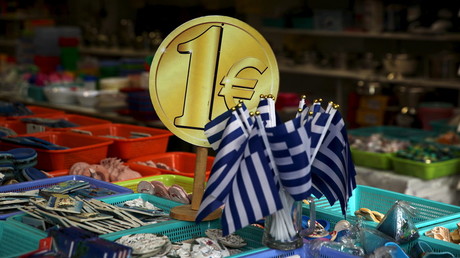Euro irreversible, says German finance minister after Merkel & Macron agree on Eurozone budget
The euro is here to stay and serve as a guarantor of a stronger, more cohesive Europe, Germany’s finance minister said as he commended French President Emmanuel Macron for spearheading the effort.
In an interview with the Rheinische Post on Saturday, Olaf Scholz argued that the future of Europe’s single currency no longer hangs in the balance with Greece getting back on its feet after a long recession and Paris and Berlin agreeing on a vision for how to reform the EU.
Asked if the euro will still exist in 10 years, Scholz has said he has no doubt about it.
“Yes, the euro is irreversible. It secures our common future in Europe,” the German minister said.
While the single currency seems to have finally weathered the European financial crisis, Europe should not sit idle, but be prepared for challenges that lie ahead, Scholz cautioned.
“The euro is doing well. We now have to make sure during the good times that we, in the eurozone, are prepared for worse times.”
Speaking on the recent rapprochement between Germany and France that saw German Chancellor Angela Merkel and Macron agreeing earlier this month to create a eurozone budget by 2021, Scholz argued that the new-found trust between two European powerhouses should be credited to Macron.
“We have a new momentum in Europe and this is thanks to President Macron,” he said, adding that the agreements negotiated by the two leaders at Meseberg Castle outside Berlin reinforce “the house of Europe.”
“It contains a sealed roof that withstands future storms and rainy days,” he said.
Ahead of the talks, French Finance Minister Bruno Le Maire suggested that the fate of the eurozone would depend on their outcome, calling them “the moment of truth for the Franco-German relationship.”
Merkel herself praised the results of the meeting that paved the way for the new joint eurozone budget calling it “a new chapter” that would boost the “convergence within the eurozone.”
Scholz has dismissed the argument brought up by some of the euro’s critics that it failed as a means of integration. In that, he, oddly enough, invoked the example of the US.
“Europe would be less united and less strong without a common currency. Even the US is a country with the [single] currency, even though they have regions that are developing very differently,” he said, brushing off arguments that the eurozone is, in its present form, not a state. Moreover, he argued that part of the challenges the EU has faced over the years stem from the EU’s focus on developing a common market while turning a blind eye to common politics.
“Citizens want Europe to be more effective in foreign and security policy, in securing external borders, in dealing with flight and migration, in responding to the question of how we can technologically compete with the US and China,” he said, stressing that “as nation-states alone, we will not be able to secure our future.”
Merkel and Macron’s wish to pool individual European nations’ finances into a kind of a joint budget, the terms of which are yet to be thrashed out, did not sit well with the German Chancellor’s Bavarian allies. Bavarian Prime Minister Markus Soeder said that the move is premature, as the EU is still battling the debt crisis, and it would ultimately lead to German taxpayers salvaging troubled EU economies.
“We don’t want a community of debt,” he said on Thursday.
Like this story? Share it with a friend!







Comments are closed.